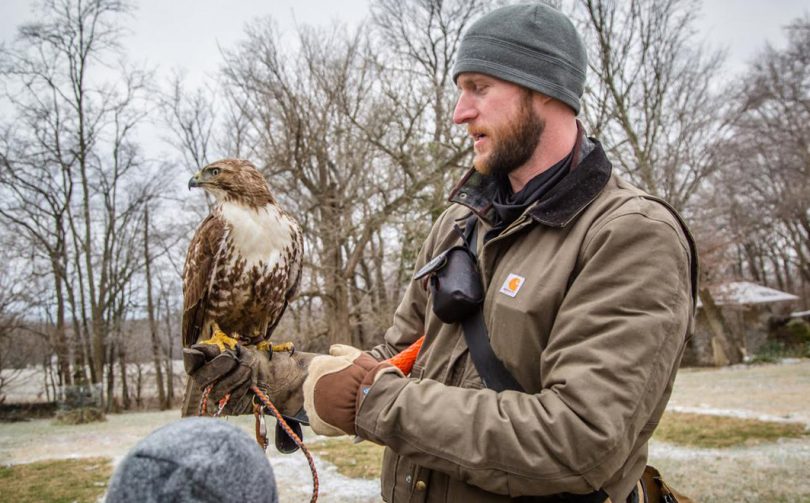
Sure there’s your career, but sometimes college can prepare you for a rewarding hobby, too.
Take Tyler Rankin, for instance. For his hobby, the 2006 Transylvania University graduate is drawing from not only what he learned as a biology major, but also the leadership and organizational skills he developed as the Pi Kappa Alpha fraternity president.
Rankin is a falconer … a serious one. In fact, he was recently appointed as Southeastern regional director of the North American Falconers Association — he also serves on the group’s board of directors and as president of the Kentucky Falconers Association.
His interest began in graduate school at Eastern Kentucky University, where he researched the nesting success of sharp-shinned hawks. The study was funded by a Kentucky Department of Fish and Wildlife Resources grant related to falconry permitting. (At first Rankin was like: “Wait, there’s falconry in Kentucky?”)
Through his research, he met falconers who’d teach him things like how to find nests, and he started reading more about the sport. Rankin’s interest took flight from there.
Now in his seventh season of falconry, he’s helping educate others about it, coordinating events and promoting conservation efforts.
“Falconry in itself is a conservation sport,” said Rankin, who by trade is a project manager for an environmental consulting firm helping reduce the ecological impact of development on streams and wetlands.
Rankin explained how his falconry groups — along with the sport in general — benefit natural habitats, including raptor populations.
For example, falconers support land preservation efforts so they’ll have places to practice their sport, which involves training the birds to hunt wild game. “The way you’re going to have the most success in falconry is finding enough game,” said Rankin, who lives near Burlington, Kentucky.
Also, the falconers often trap and train young raptors who’re already skilled hunters and then eventually release them back into the wild. Rankin said a large majority of these birds would otherwise die in their first year — so they benefit from being taken care of during this first winter … while sharpening their hunting skills.
Rankin also pointed out how peregrine falcons were nearly extinct when falconers helped them stage a comeback through captive breeding.
His national club has over 1,600 members across the U.S. (some of them hunting with peregrines). Rankin’s roles at this level include working with state and federal regulators, coordinating vendors for the group’s annual convention and supporting individual chapters. “I want to help other states in my region grow their clubs,” he said.
The Kentucky Falconers Association has grown over the years — now most of the roughly 100 licensed falconers in the state are members. The KFA sponsors workshops to help with the licensing process, which includes a two-year apprenticeship and meeting certain standards.
Rankin, of course, finds a personal satisfaction in falconry (in addition to the enjoyment he gets leading groups in a common cause like he did with the Pikes at Transy). “You’re just immersed in nature,” he said. “You’re getting a close-up, personal view of that predator-prey relationship; you’re getting to watch these birds do what they naturally do in their environment. It’s pretty special.”

